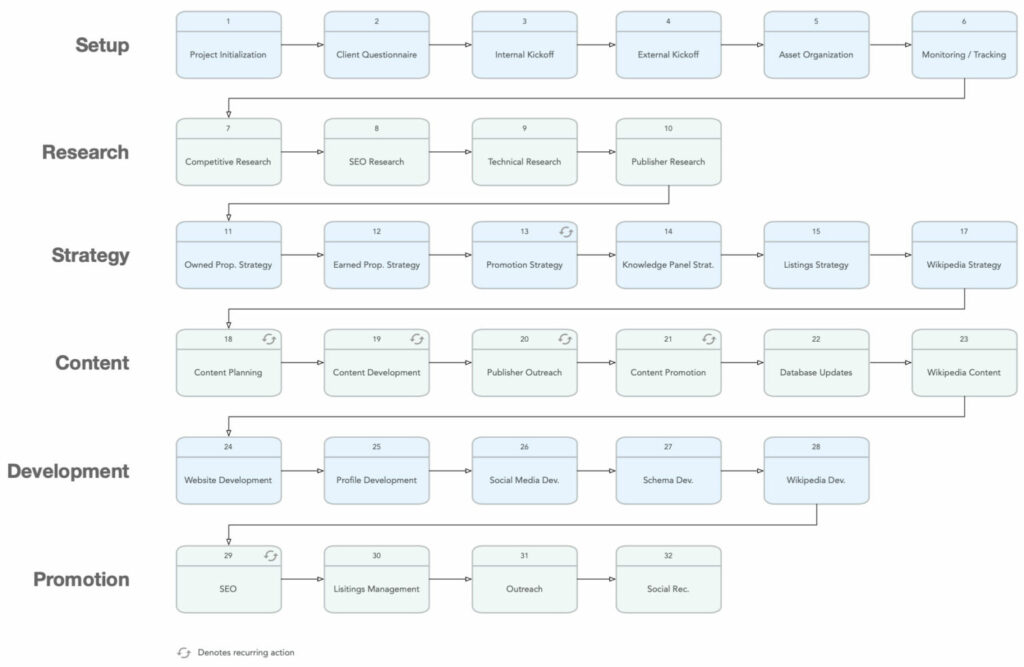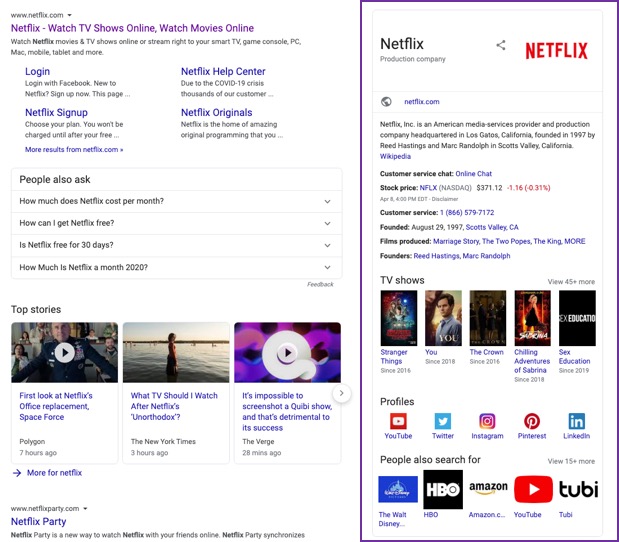What Goes Into a Reputation Program

Components of an ORM Program
How does one “do” reputation management, though? Reputation management is no simple task; it requires a diverse skill set and a comprehensive strategy. The following are a few key components that go into effective reputation management:
- Negotiation Skills: An essential aspect of reputation management is the ability to negotiate. This may involve handling disputes, resolving conflicts, or navigating difficult interactions in a way that portrays the individual or organization in a positive light.
- Content Creation and Promotion: Creating high-quality, relevant content is key to shaping a positive online image. This includes written content, like blog posts and articles, as well as multimedia content like videos and podcasts. Once created, this content must be effectively promoted across various platforms to reach its intended audience.
- Social Media Management: Platforms like Facebook, Twitter (X), Instagram, and LinkedIn are often battlegrounds for reputation management. Though there are pros and cons, effective use of these platforms can enhance visibility, engage audiences, and shape public perception.
- Knowledge Panel Management: Google’s Knowledge Panel is often the first thing people see when searching for a brand or individual. Reputation management involves managing this panel effectively, ensuring it reflects accurate and positive information. This involves identifying the sources of information and improving them where possible, as well as taking control of a Knowledge Panel directly to make some edits from within.
- Crisis Management: In today’s world of social media and viral content, a negative incident can quickly escalate into a full-blown crisis. Reputation management often includes using crisis management techniques to address and mitigate any potential crisis that may arise in the future.
- Technical Skills: Understanding the internet’s technical aspects is vital, as is knowing how to use them to one’s advantage. This includes being familiar with how search engines work, how algorithms affect visibility, and how to use various web tools to monitor and manage online reputation.
- Search Engine Optimization (SEO): SEO is about making sure that the right people find the right information about you online. By optimizing websites and content for search engines, you can ensure that positive and relevant information appears high in search results.
- Public Relations: Public relations plays a crucial role in managing reputation by shaping the narrative around an individual or organization. This involves dealing with the media, organizing events, and communicating effectively with the public.
Negotiation Skills
Effective negotiation skills are important for managing online disputes, resolving conflicts, and addressing negative content when you are contacting the author or editor and asking for revisions or removal of content. Whether dealing with dissatisfied customers, media inquiries, or influential online voices, the ability to negotiate can help turn potential reputation-damaging situations into opportunities for positive engagement. In reputation management, successful negotiation ensures that the organization’s image remains intact, even when faced with challenges.
Content Creation and Promotion
Content is the cornerstone of online reputation management. Creating high-quality, relevant content helps control the narrative around a brand or individual. This includes blog posts, articles, videos, and podcasts that showcase expertise, values, and achievements. Once created, this content must be strategically promoted across various channels, including social media, websites, and email campaigns, to reach and influence the target audience effectively. From there, social media and SEO are used to enhance their visibility for branded search queries.
Social Media Management
Social media platforms are critical for shaping public perception and engaging with audiences. Effective social media management involves monitoring brand mentions, responding to customer queries, and proactively sharing content that aligns with the brand’s values. By consistently managing these platforms, organizations can build a positive online presence, mitigate negative feedback, and foster strong community relationships.
Knowledge Panel Management

Google’s Knowledge Panel often serves as a first impression for online searches about a brand or individual. Effective management of this panel ensures that accurate and positive information is prominently displayed. This involves updating and optimizing the sources feeding into the panel, ensuring they reflect the desired image. Taking control of the Knowledge Panel allows for direct edits, further enhancing online reputation.
Crisis Management
Crisis management is an essential component of online reputation management, especially in the fast-paced digital world where negative news can quickly go viral. Preparing for potential crises and having a clear strategy in place allows organizations to respond quickly and effectively, minimizing damage to their reputation. This includes timely communication, transparent actions, and monitoring the situation as it evolves.
Technical Skills
A solid understanding of the technical aspects of the Internet is necessary for effective reputation management. This includes knowledge of search engine algorithms, website management, and online tools that monitor brand mentions and sentiment. Technical skills allow professionals to optimize online presence, ensure positive content ranks higher in search results, and manage any potential threats to a brand’s reputation.
Search Engine Optimization (SEO)
SEO makes positive content about a brand or individual rise in search engine results. By optimizing websites and content for relevant keywords, reputation managers can push favorable information to the top of search results while pushing down negative or irrelevant content. SEO is a proactive strategy for controlling online narratives and enhancing reputation visibility.
Public Relations
Public relations (PR) is integral to online reputation management, as it shapes the public narrative and manages media relations. PR efforts involve crafting press releases, managing media inquiries, organizing public events, and engaging with key stakeholders. Through strategic communication, PR helps build and maintain a positive image, ensuring that the public perceives the brand or individual in a favorable light.
Tags: Online Reputation Management.
